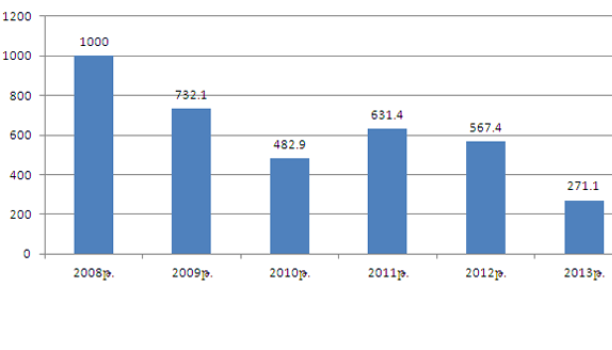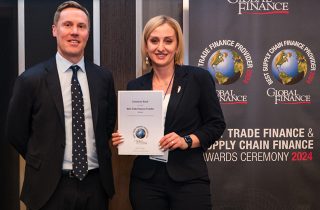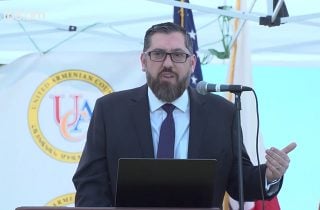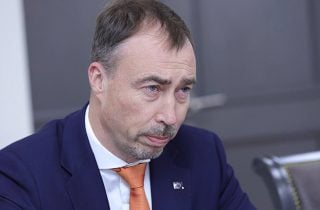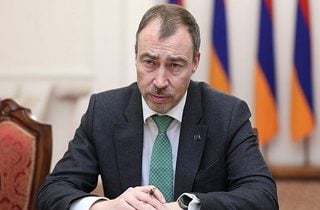Tigran Sargsyan’s six years
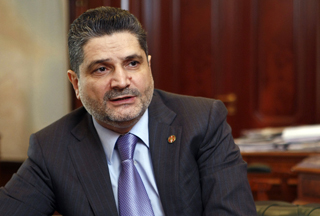
In April 2008, when Tigran Sargsyan was appointed Prime-Minister of Armenia, only a few people believed that he would stay in power more than one year.
However, Tigran Sargsyan stayed in power for six years. The only PM that was in power longer than him was Andranik Margaryan. There were people who were expecting his resignation, and even people who congratulated others for this resignation. Notwithstanding this kind of attitude to Tigran Sargsyan, he will remain in the history of Armenia as one of the long-lasting Prime-Ministers.
Herein we analyze a number of economic indicators to evaluate Tigran Sargyan’s six years in office.
Before his appointment Armenia’s GDP had been growing at fast pace. However, it is a different issue whether this growth contributed to the well-being of people or whether it was sustainable.
In the first year of Tigran Sargsyan’s office (2008) Armenia’s GDP was 6.8%, which was lower by several points than the planned level. In 2009 as the economy was hit by the financial crisis the slump was 14.1%, followed by slow recovery. In 2010 there was 2.2% growth, in 2011 – 4.7%, and in 2012 – 7.2%. In 2013 the planned growth was 7% (as instructed by the president) but the real growth reached 3.5% only.
In the end of 2008 Armenia’s GDP was 3,650 bln drams, and in 2013 – 4,266 bln. However, the same amount expressed in dollars shows a different picture. In the end of 2008 it was 11.7 billion, and in the end of 2008 – 10.4 billion drams. This shows that Tigran Sargsyan was unable to bring the economy to the same level as it was before the crisis.
The deepest slump was in the sector of construction that had been fueling Armenia’s economic growth. In 2008 the volume of construction was 842.3 billion drams, while in 2013 twice less – 442.2 billion drams.
Tigran Sargsyan’s team was concerned about the slump in the sector of construction; however they were trying to find positive signs in that trend as they assured that the economy was being diversified. The volume of construction and mining business really became significant in Armenia’s economy. The volume of production since 2008 grew from 751.2 billion to 1,240.5 billion in 2013. In the same period the volume of services grew from 731.6 billion to 1,022.7 billion.
In 2008 the average salary rate was 91,300 drams, while in December 2013 it was 158,900 drams. The growth of salaries in this period reached 1.74 times. Consumer price indices in the same period grew by 1.4-1.5 times. The official statistics says that the purchasing power is higher now than 6 years ago.
On the other hand, the poverty rate has grown by 2,5 times and reached 35%. While the unemployment rate was 16.4% in 2008, now it is 17.5%.
Tigran Sargsyan’s government has been able to cut down the negative balance of foreign trade. In 2008 the foreign trade balance was 3,342 million dollars, while in 2013 it was less than 3 billion. This difference was due to export growth.
Notwithstanding the above, the most criticized sector under PM Sargsyan’s office was foreign trade.
While in 2008 the foreign debt of Armenia was 1.5 billion dollars (the GDP’s 13.2%), in the end of 2013 it reached almost 4 billion. His government was criticized not only for increasing the foreign debt but also for bad management of borrowed funds.
The worst point in Tigran Sargsyan’s office term was the reduction of foreign direct investments. Even though in his office the Armenian government made a number f reforms and improved its status in international reports, the volume of direct investments in Armenia is in a skyfall now.
In 2008 the volume of foreign direct investments in Armenia was 1 billion dollars, which was higher by 71.9% than the same amount of the previous year. In 2013 the volume of foreign direct investments was 271.1 million dollars (twice less than in 2012).
In addition to this, during the past 6 years over 250 people emigrated from Armenia, which many people believe was due to Tigran Sargsyan’s government.
Even according to the official information the sic years of Tigran Sargsyan’s office cannot be considered effective in terms of the economy. However, Tigran Sargsyan was not the only person guilty in this failure. We believe that even a group of Noble prize winners would not be able to significantly improve the Armenian economy as the problems are far deeper than they seem to be.
Whatever the results are, Tigran Sargsyan will be remembered with changes such as the compulsory vehicle insurance system, administrative ruling that made people buckle up when driving, he idea of making Dilijan a financial center, Jermuk – a tourism center, electronic governance system and the technological park in Gyumri that has not come true. The most significant change that will make people remember the PM is the compulsory pension fund reform.
He was able to make some projects come true, and others were failed. At the time of adopting the compulsory vehicle insurance system there were people who opposed to it too. Whatever the changes are, we believe the biggest change that Tigran Sargsyan claimed to do but failed to do is making a revolution of thinking within the government system. He was speaking of this since the first day of his appointment. Now we see that he changed his mind as he saw that it would be impossible.
By Babken Tunyan









